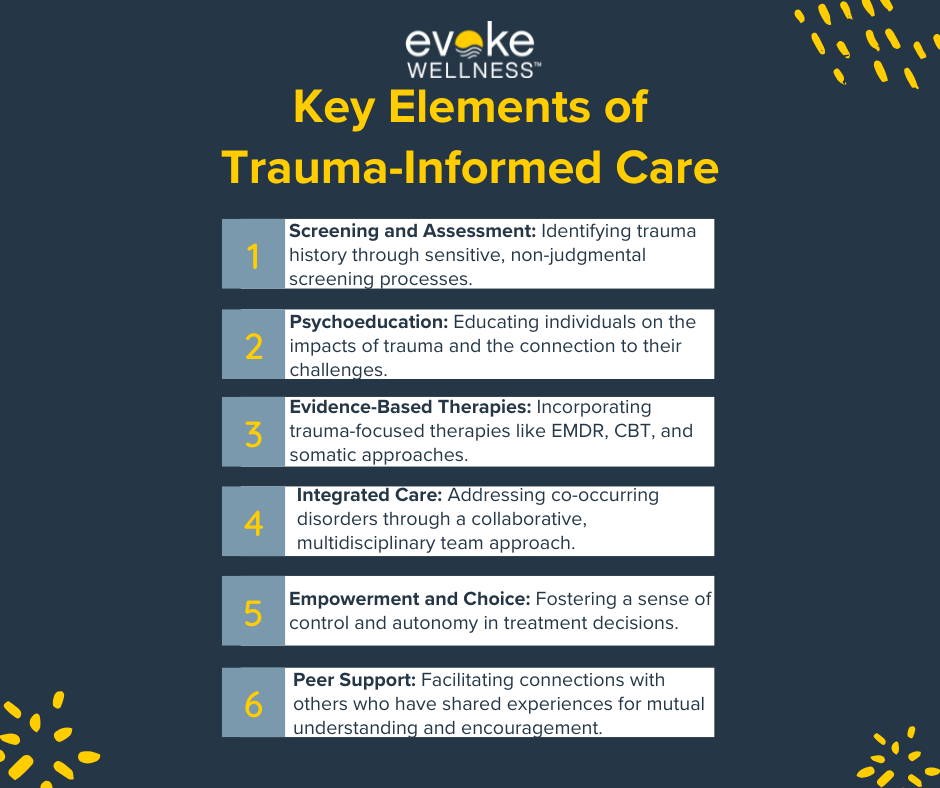As you navigate the complex landscape of addiction and mental health recovery, understanding trauma-informed care is crucial. This therapeutic approach recognizes the widespread impact of trauma and integrates that knowledge into treatment practices. Recent studies show that up to 75% of individuals in substance abuse treatment report histories of trauma. By addressing underlying trauma, dual diagnosis treatment can more effectively tackle both addiction and mental health issues simultaneously. At Evoke Wellness, we believe trauma-informed care is essential for fostering resilience, promoting healing, and achieving lasting recovery. Discover how this holistic approach can transform your journey to wellness and provide the comprehensive support you need.
Together, let’s embrace the journey to recovery and the promise of a new beginning. Call us at (866)429-2960 today or reach out online.
Understanding Trauma-Informed Care
What is Trauma-Informed Care?
Trauma-informed care is a holistic, person-centered approach to healthcare that recognizes the profound impact trauma can have on an individual’s physical, emotional, and mental well-being. It acknowledges that traumatic experiences are often underlying factors in substance abuse, mental health issues, and other maladaptive behaviors.
- Trauma-informed practices prioritize safety, trustworthiness, choice, collaboration, and empowerment.
- They aim to create an environment that avoids inadvertent re-traumatization and promotes healing.
The Need for a Trauma-Informed Approach
Studies show a strong correlation between trauma and addiction, with over 80% of individuals seeking substance abuse treatment reporting a history of trauma. Similarly, traumatic experiences are highly prevalent among those with mental health conditions like depression, anxiety, and PTSD.
Failure to address underlying trauma can undermine treatment effectiveness and increase the risk of relapse or symptom exacerbation. By adopting a trauma-informed lens, care providers can deliver more holistic, personalized, and effective treatment.
By prioritizing trauma-informed practices, addiction and mental health treatment providers can cultivate an environment of safety, trust, and empowerment, paving the way for lasting recovery and healing.
The 4 C’s of Trauma-Informed Care
Compassion
A key pillar of trauma-informed care is approaching individuals with compassion. This means recognizing that trauma can manifest in various ways, from substance abuse to mental health challenges. Over 90% of US adults have experienced a traumatic event, underscoring the widespread impact. Compassionate care involves de-stigmatizing coping behaviors and emphasizing an individual’s strengths and resilience.
Consistency
Consistency is crucial in creating a safe, predictable environment for those healing from trauma. A consistent approach, free from judgment or blame, fosters trust and a sense of security. This principle extends to care teams, where clear communication and coordination ensure individuals receive coherent support throughout their recovery journey.
Collaboration
Trauma-informed care promotes collaboration by leveling power differences and involving individuals in shared decision-making. This empowering approach acknowledges their wisdom and lived experiences, fostering a partnership between care providers and those they serve. Collaborative models have been shown to improve patient engagement, treatment adherence, and overall health outcomes.
Cultural Competence
Recognizing and addressing biases, stereotypes, and historical trauma is essential for culturally competent care. This principle involves understanding how cultural backgrounds shape trauma experiences and responses. By embracing humility and responsiveness, care providers can create an environment that honors diversity and promotes healing within a culturally relevant framework.
By embodying the 4 C’s of trauma-informed care, healthcare organizations can create a supportive, holistic environment that addresses the root causes of addiction and mental health challenges. This approach has the potential to improve health equity and promote long-term recovery.
The 5 Principles of Trauma-Informed Care
Trauma-informed care recognizes the widespread impact of trauma and aims to create an environment that promotes healing and avoids re-traumatization. It is guided by five key principles that shape how treatment systems and providers work with clients who have experienced trauma.
Safety
Ensuring physical and emotional safety for all individuals involved is the top priority. This involves creating a secure, non-threatening environment where clients feel unintimidated and at ease. Establishing a sense of safety helps build trust and facilitates the healing process.
Trustworthiness and Transparency
Building a culture of trustworthiness is essential. Caregivers must demonstrate integrity, consistency, and transparency in their interactions with clients. Clear boundaries and expectations help clients feel safe enough to be vulnerable and engage in the therapeutic process.
Peer Support
Peer support plays a crucial role in trauma-informed care. Empowering clients through interactions and support from others with similar lived experiences can foster a sense of community and shared understanding. Peer support is one of the core principles of this approach.
Collaboration and Mutuality
Therapy is a collaborative process between the client and therapist, rather than a strict protocol imposed on the client. Evoke Wellness emphasizes the importance of involving clients in their treatment plan and working towards mutually agreed-upon goals, recognizing the shared experience of recovery.
Empowerment, Voice, and Choice
Trauma-informed care empowers clients by giving them a voice and allowing them to make choices about their treatment plan. This fosters a sense of control and promotes resilience, as clients discover and build on their existing strengths. This approach helps clients believe that recovery is possible.
By adhering to these five principles, trauma-informed care creates an environment conducive to healing, where clients can feel safe, respected, and empowered in their journey towards recovery.
Trauma-Informed Care in Mental Health Treatment
Understanding the Trauma-Mental Health Link
Trauma plays a pivotal role in the development and exacerbation of mental health conditions. According to the Substance Abuse and Mental Health Services Administration (SAMHSA), individuals who have experienced trauma are at a higher risk for developing mental health disorders, including depression, anxiety, and post-traumatic stress disorder (PTSD). Addressing the underlying trauma is crucial for comprehensive mental health treatment and long-term recovery.
Integrating Trauma-Informed Practices
Trauma-informed care shifts the focus from “What’s wrong with you?” to “What happened to you?”. This approach acknowledges that healthcare organizations need to understand a patient’s full life situation to provide effective, healing-oriented care. Key principles of trauma-informed therapy include:
- Ensuring physical and psychological safety for clients
- Building trust and transparency in the therapeutic relationship
- Empowering clients by recognizing their strengths and resilience
- Addressing biases, stereotypes, and historical trauma
Trauma-Sensitive Assessments and Interventions
Trauma-sensitive assessments should create a safe space, avoid re-traumatization, and reduce stigma and shame. Building a strong therapist-client relationship is crucial, focusing on secure attachment, reparenting, boundary repair, and emotional availability. Trauma-informed therapy techniques may include:
- Eye Movement Desensitization and Reprocessing (EMDR)
- Dialectical Behavior Therapy (DBT)
- Somatic Experiencing
- Trauma-Focused Cognitive-Behavioral Therapy (TF-CBT)
Holistic Healing and Resilience
By addressing the root causes of trauma, mental health professionals can help clients develop healthy coping strategies and emotional regulation skills. This empowers individuals with the understanding and tools necessary for long-term healing and resilience. Ultimately, trauma-informed care promotes a holistic approach to mental health recovery, fostering a safe and supportive environment for personal growth and transformation.
The 4 R’s of Trauma-Informed Care
Realizing the Widespread Impact
Trauma can occur on individual, interpersonal, and collective levels, with profound impacts across communities. It’s crucial to realize that trauma is widespread and can have lasting effects on mental health, behavior, relationships, and overall well-being. Recent statistics show a concerning rise in trauma-related issues due to the COVID-19 pandemic.
Recognizing Signs and Symptoms
The next step is learning to recognize the signs and symptoms of trauma in individuals, which can manifest behaviourally, emotionally, relationally, cognitively, and through self-esteem issues. Traumatic experiences can be triggered by various environmental factors, making it essential to create trauma-sensitive environments.
Responding with Trauma-Informed Practices
Once trauma is realized and recognized, it’s critical to respond by integrating that knowledge into policies, procedures, and practices. This involves creating physically and emotionally safe spaces, facilitating positive relationships, teaching emotional regulation techniques, and providing individualized support to promote healing and recovery.
Resisting Re-Traumatization
Finally, trauma-informed care emphasizes resisting re-traumatization by ensuring organizational practices don’t inadvertently trigger or re-traumatize individuals. This involves establishing relational policies, discipline approaches that prioritize well-being over punishment, and ensuring adequate support for staff to prevent burnout and secondary trauma.
Trauma
Trauma’s Impact on Recovery
Trauma can profoundly impact an individual’s journey towards addiction and mental health recovery. Traumatic experiences, such as abuse, neglect, or exposure to violence, can leave deep emotional scars that often lead to maladaptive coping mechanisms like substance abuse. According to the Substance Abuse and Mental Health Services Administration, over 60% of adults report experiencing abuse or other difficult family circumstances during childhood.
Unresolved trauma can also contribute to the development of co-occurring mental health disorders like post-traumatic stress disorder (PTSD), anxiety, and depression, further complicating the recovery process. Ignoring the role of trauma in addiction and mental health issues can hinder progress and increase the risk of relapse.
Trauma-Informed Care: A Holistic Approach
Effective treatment for individuals with trauma histories requires a holistic, trauma-informed approach that addresses both the substance use disorder and the underlying trauma. Trauma-informed care is an organizational model that recognizes the widespread impact of trauma and aims to create a safe, supportive environment for clients to explore and heal from their experiences.
At Evoke Wellness, our trauma-informed care approach is integrated throughout all aspects of treatment, from admissions to clinical care. Our staff is trained to understand the effects of trauma and respond with empathy, compassion, and evidence-based interventions tailored to each client’s unique needs.
Specialized Therapies for Trauma Recovery
Evoke Wellness offers a range of specialized therapies to help clients process and heal from trauma, including:
- Cognitive-Behavioral Therapy (CBT): By identifying and challenging negative thought patterns, CBT helps clients develop healthier coping strategies and emotional regulation skills.
- Eye Movement Desensitization and Reprocessing (EMDR): This evidence-based therapy helps clients process and resolve traumatic memories, reducing the distress associated with past experiences.
- Dialectical Behavior Therapy (DBT): Focused on mindfulness, distress tolerance, and emotional regulation, DBT equips clients with essential skills for managing the impact of trauma.
By integrating these trauma-focused therapies with comprehensive addiction and mental health treatment, Evoke Wellness empowers clients to address the root causes of their struggles, fostering lasting recovery and personal growth.
Conclusion
As you navigate the complex landscape of addiction and mental health treatment, remember that trauma-informed care is not just a buzzword—it’s a vital approach that can significantly improve outcomes. Recent studies show that up to 75% of individuals in substance abuse treatment report histories of trauma. By addressing these underlying issues, you’re tackling the root causes of addiction and mental health disorders. By choosing a treatment center that prioritizes trauma-informed care, you’re giving yourself or your loved one the best chance at long-term recovery and improved mental health.
Begin Your Journey with Evoke Wellness
If you or a loved one is considering treatment, Evoke Wellness invites you to contact us. Our compassionate team is ready to answer your questions, discuss your needs, and help you take the first steps toward recovery. At Evoke Wellness, you will find more than just a treatment program – you’ll discover a community dedicated to your wellness and success. Together, let’s embrace the journey to recovery and the promise of a new beginning. Call us at (866)429-2960 today or reach out online.



